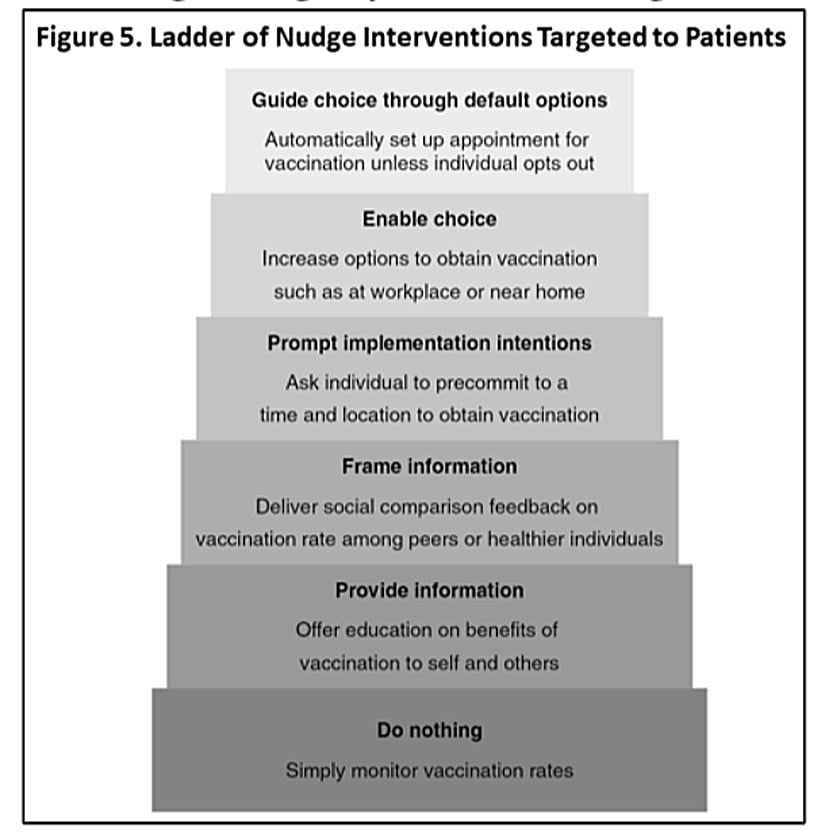by Brenda Baletti, Ph.D., Childrens Health Defense:
 According to grant documents obtained by Children’s Health Defense via a FOIA request, the NIH is spending $2.2 million in taxpayer money to test personalized “nudges” to coax older people into getting more vaccines.
According to grant documents obtained by Children’s Health Defense via a FOIA request, the NIH is spending $2.2 million in taxpayer money to test personalized “nudges” to coax older people into getting more vaccines.
Using U.S. taxpayer dollars, researchers at two universities are identifying older people behind on their recommended vaccines and testing personalized “nudges” to coax them into getting more shots.
TRUTH LIVES on at https://sgtreport.tv/
According to grant documents obtained by Children’s Health Defense (CHD) via a Freedom of Information Act (FOIA) request, the National Institutes of Health (NIH) is funding the $2.2 million “BE IMMUNE” clinical trial, which began in 2020 and will run through 2025.
Researchers at the University of Pennsylvania and the University of Washington are using Electronic Health Records (EHR) data — the electronic records from doctors’ offices containing patients’ detailed health and demographic data — to target African American, Hispanic and Asian people with lower flu, pneumococcal and herpes zoster vaccination rates.
The ongoing study blames the “poor vaccination rates” on patients’ and clinicians’ “widespread decision-making biases.” The trial is testing strategies drawn from behavioral economics, which uses insights from psychology to understand — and in this case to “nudge” or direct — people’s decision-making behavior.
The randomized controlled study is headed up by Dr. Shivan Mehta and a team of healthcare management experts who combine medical and business-based strategies to run studies like these.
The trials often are based in Penn Medicine’s in-house “Nudge Unit,” where behavioral design teams are dedicated to figuring out how to influence patient choices.
The grant is part of a massive initiative by the NIH to increase vaccine uptake by changing how people make decisions. The initiative has included hundreds of millions of dollars in grants since 2020 to create “culturally tailored” pro-vaccine materials to promote COVID-19 and flu vaccines.
It also included more than 50 grants worth $40 million designed to increase HPV vaccine uptake.
Testing the ‘ladder’ of behavioral interventions
The study is testing different “nudges” at more than 100 primary care practices at Penn Medicine, University of Washington Medicine and the Veterans Affairs Health System, one of the world’s largest EHR vendors in the world.
Over 1,000 primary care physicians and thousands of eligible patients at those practices are involved in the trial.
The range of tested interventions is scaled on a ladder.
Nudges lower on the ladder try presenting people with information so they can make their own decisions about vaccines —- methods that typically are not very effective for increasing vaccine uptake, the researchers said.
Nudges higher on the ladder either prompt people to make decisions, or simply plan their decisions for them.
For example, one nudge automatically sets up vaccination appointments for people, compelling them to go to their appointment and get vaccinated unless they intentionally opt out.

The “opt-out” framework has been effective in other areas of healthcare, such as colorectal cancer screening or persuading more people to take their flu shots, the researchers reported.
Netflix uses prompts to encourage binge-watching — healthcare should prompt people to get more shots
Penn’s “Nudge Unit,” which bills itself as the “world’s first behavioral design team embedded within a health system,” houses the study, which is also being conducted in a similar unit at the University of Washington.
Read More @ ChildrensHealthDefense.org



